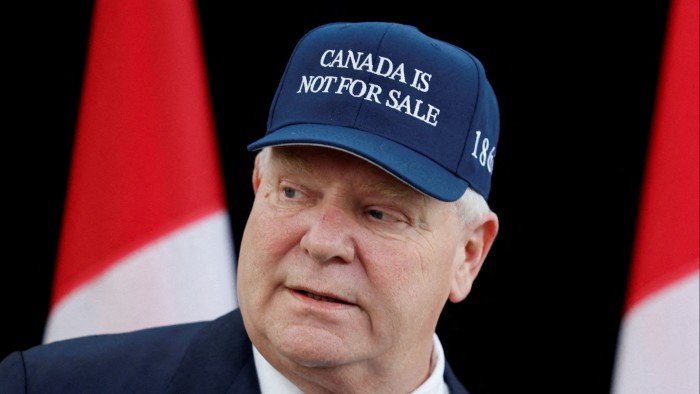A new wave of economic nationalism has swept across Canada as Donald Trump’s tariffs inspire anger but also a patriotic campaign to “Buy Canadian”.
‘Made in Canada’ signs have popped up in grocery stores, lists of Canadian alternatives to US products are being circulated and comedians are devoting skits on national television to how best to avoid American consumer goods.
Liam Mooney and his partner Emma Cochrane, founder of an Ottawa-based design and strategic communications firm, have noticed a jump in sales for their newly launched fashion statement — a hat emblazoned with “Canada Is Not for Sale”.
“It’s been incredible, we’ve seen a spike in sales since the tariff announcement on Saturday,” Mooney said. “It went from a concept to viral after Ontario premier Doug Ford wore it to a meeting.”
Mooney said Canadians are “angry about the disrespect” from the new US administration. The hat was a response to Trump’s tariff threats and suggestions the country should become the 51st US state.
“It is defiant patriotism, we were watching these Fox News interviews and the increasing hostility was abhorrent, and at one point, we thought ‘enough is enough,’” he said.
Prime Minister Justin Trudeau said Canada will implement tariffs on C$30bn worth of goods on Tuesday, followed by additional levies on C$125bn worth of American products, set to kick in in 21 days. But he said all Canadians had a role to play in the trade war effort.
A lot of the anger stems from Canada seeing the actions of the US as the bullying of a weaker, peaceful ally. Trudeau described their shared history that goes back to World War 1 and includes supporting US troops in Korea and Afghanistan, to recent support fighting fires in Los Angeles.
“We have fought, and died, beside you,” Trudeau said.
He urged the nation to buy Canadian products over well-known and well-loved American items in an effort to support the economy and inflict as much pain as possible on the US economy.
“It might mean opting for Canadian rye over Kentucky bourbon, or foregoing Florida orange juice altogether,” he said. “It might mean changing your summer vacation plans to stay here in Canada.”
About C$3.6bn worth of imports and exports flow every day across the Canadian and US border, according to official data.
Trudeau said Canadians are “perplexed” by Trump’s tariffs but more broadly, a country famous for its politeness is uniting against a common enemy and finding new reserves of anger.
On Saturday night at the National Hockey League’s Ottawa Senators-Minnesota Wild game, the crowd booed the American national anthem.
“Emotions may run high here and there, especially around hockey games,” Trudeau said, referring to the incident.
Chrystia Freeland, the former finance minister who is vying to become Canada’s next prime minister in a party leadership race, said boycotting American products was the best way to stand up to Trump and his “billionaire buddies”.
“If you can, Buy Canadian. And, try your best not to buy products made in the US,” she said in a statement on Sunday.
Canada’s government has released an extensive list of US items, from turkey to tea, which will attract a 25 per cent tariff.
Candace Laing, president of the Canadian Chamber of Commerce, is also behind the push to buy local.
“If we can’t trade south, let’s diversify our trading partners and dismantle unnecessary internal trade barriers to keep goods and services flowing north, east, and west,” she said.
Anita Anand, minister of internal trade, is hoping Trump’s tariffs are a catalyst to untangle interprovincial trade barriers that hamper the free flow of goods and services within Canada.
Last year, more than C$530bn worth of goods and services moved across provincial and territorial borders, representing almost 20 per cent of Canada’s GDP. But eliminating these barriers will potentially add up to C$200bn to the Canadian economy, she said.
“Now is the time to choose Canadian,” she told the Financial Times.
“There is definitely a feeling of nationalism and the need to protect our sovereignty at this moment, there’s a push to be supporting Canadian business and shopping local,” she said.
On Sunday Premier Doug Ford, one of the most outspoken critics of the Trump tariff plan, instructed the Liquor Control Board of Ontario to stop selling American wine, beer, spirits and seltzers on Tuesday, a trade worth C$1bn.
“There’s never been a better time to choose an amazing Ontario-made or Canadian-made product. As always, please drink responsibly,” Ford posted on X.
Premier David Eby announced similar measures in British Columbia that would “immediately stop buying American liquor from red states, and remove the top-selling “red-state” brands from the shelves of public liquor stores.
These targeted retaliations have captured the attention of some Republican senators who have also raised their concerns about the impact of tariffs on their economy.
But others, like Texas Governor Greg Abbott, are spoiling for a fight.
“Careful Trudeau,” he posted on X.
“The Texas economy is larger than Canada’s. And we’re not afraid to use it.”
Read the full article here




